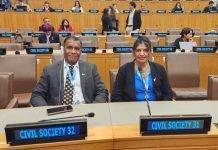THE NETHERLANDS — Aruba, Curaçao, St. Maarten and the Netherlands have reached agreement on the submission of the proposal of the Caribbean Entity for Reform and Development (In Dutch: Caribisch Orgaan voor Hervorming en Ontwikkeling, COHO). The Kingdom Act forms the foundation for a new form of multi-year cooperation between the countries in the Kingdom.
Due to the COVID-19 pandemic, the economies of Aruba, Curaçao and St. Maarten have been hit hard. The Netherlands offered help in the fight against COVID-19 and also supported with food packages. In addition, one billion euros in emergency support in the form of liquidity loans was provided to support public finances in the event of a sudden halt in economic activity.
As a condition for granting the liquidity loans, it has been agreed upon that the countries will accelerate work on reforms that strengthen them. The countries are sticking to that agreement. The aim is to better enable the economy and society to cope with a crisis in the future so that governments are able to offer new opportunities to residents and businesses. To support the countries in this, it has been agreed that an independent Caribbean Entity for Reform and Development will be established.
In anticipation of the formal establishment of COHO, a national package has each been agreed with Aruba, Curaçao and St. Maarten. The measures from the country packages are further elaborated per country in subsequent implementation agendas. In this way, every Caribbean country is able to take steps in a way that suits them. COHO will provide support and supervise the implementation of the topics described in the packages. These tasks are currently still carried out by the Temporary Work Organisation (TWO).
The four countries reached a final agreement this week on the elaboration of the Kingdom Act. Changes compared to previous consultations include clearer agreements with the countries on the incorporation of the country packages into the various budgets. It has also been agreed that the objections that exist about the powers of the financial supervisors C(A)ft will be further elaborated in the implementation phase.
The agreements on the possible implications of the elaboration of the cooperation protocol between the C(A)ft and COHO, containing the mutual tasks, roles and responsibilities, are also recorded. COHO and the C(A)ft will consult with the countries’ administrations about the cooperation protocol before it can be established or amended.
Aruba, Curaçao and St. Maarten have drawn attention to a number of concerns regarding the enforceability of the law within the constitutional legal order. These points include ensuring policy space and autonomy of governments, the concurrence between C(A)ft and COHO, and the scope for investment to implement the reforms and flanking policies. The Netherlands has promised to discuss this and to make agreements.
The bill now goes to the Parliament of the countries and the House of Representatives. Later in the process, the Senate is also considering it.






























